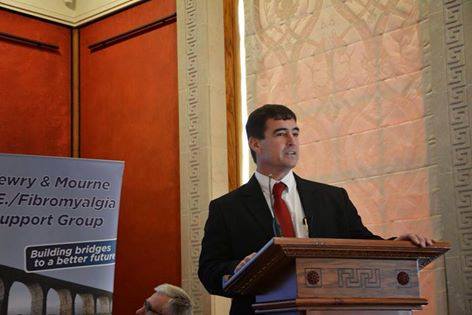Permission has been granted to share this letter below, a highly respected and highly educated response on the preposterous idea that ME patients remain severely, physically debilitated due to an irrational ‘fear of exercise.’
Due to recent inaccurate media reporting of a misleading study, performed by some notorious UK psychiatrists, I asked for the opinion of a world leading expert in the area of exercise science.
THANK YOU for your support Professor Mark VanNess Sr. VanNess! Letter below.
The lives of patients could be so dramatically improved and even saved if some very powerful psychiatrists would just end their agenda to literally crucify us and sit down to study the biomedical evidence. This post contains just one example, there are thousands more.
In February 2014 we provided a platform in Stormont for the presentation of the groundbreaking, scientific findings from the Workwell Foundation in CA.
The presentation included scientific evidence for measuring reduced functional capacity and post-exertional fatigue following physical activity and which are hallmark symptoms for patients suffering from M.E. with 95.1% ACCURACYhttp://ptjournal.apta.org/content/early/2013/06/26/ptj.20110368.short
and
http://www.workwellfoundation.org/wp-content/uploads/2013/08/Press-Release-2-day-CPET-Final1.pdf
“Dear Joan,
I was saddened to see the press releases regarding the ME/CFS studies from Kings College London. It seems to me they’ve once again missed important nuances of the disease. Nearly all ME/CFS sufferers would either avoid or drop out of any experiment that employed exercise as a treatment because they know it exacerbates symptoms. The remaining subjects would either be very high functioning or consist of fatigued individuals that were incorrectly diagnosed as ME/CFS. Our studies clearly show that dynamic exercise like walking or jogging exacerbates symptoms associated with ME/CFS.
Fear and avoidance of what worsens symptoms is a natural defense mechanism against a harmful stimulus. In fact, many researchers here in the U.S. utilize graded aerobic exercise as a tool to worsen and amplify ME/CFS symptoms – not as a treatment meant to be beneficial. The therapeutic interventions we use are meant to improve quality of life for ME/CFS patients. These interventions focus primarily on strengthening muscles and improving range of motion; activities that get energy from normally functioning anaerobic metabolic mechanisms rather than impaired aerobic energy pathways. We even provide tools like heart rate monitors to help patients avoid significant aerobic exertion.
Fear of exercise is an understandable response in ME/CFS. For a patient with ME/CFS the fear of exercise is a reasonable, knowledgeable, and learned response to a noxious stimulus. If ME/CFS patients could exercise away their symptoms they most certainly would, regardless of the pain. But that is not the case. Our exercise physiologists carefully avoid aerobic exercise (which worsens the pathologies) and focus activity programs that utilize intact metabolic pathways with strength training and recumbent stretching (that help alleviate symptoms). These exercise recommendations are consistent with our understanding of ME/CFS pathology.
We would all hope that ME/CFS was viewed with attention given to immunological, metabolic, cardiovascular and neuroendocrinological dysfunction that has been demonstrated with previous research.
Good luck to you and your organization as you help us all accurately portray this illness.
Sincerely,
J. Mark VanNess, Ph.D.
Professor; Departments of Health and Exercise Science and Bioengineering
University of the Pacific
Stockton, California, USA”DVDs of the full professional’s education event in Stormont Buildings, Belfast are available from N&M support group or Professor VanNess single presentation may be viewed at this link from the Bristol event..
“Professor Mark VanNess received his doctorate in neuroscience from Florida State University in 1997 and did post-doctoral work in the department of pharmacology at the University of Texas Health Science Center at San Antonio. He teaches classes at the University of the Pacific in the College of the Pacific and College of Engineering in the areas of exercise science, nutrition and biology. He began working on CFS in 1999. His main research interest is on the role of the autonomic nervous system in immune dysfunction. He has a particular interest in the mechanisms that produce post-exertional malaise in women with CFS, especially as they contribute to physical and cognitive dysfunction.”
Please visit Sally @ Just ME for further commentary in regards to
“Prof. VanNess on recent press reports.”
“The Other Side Of The Stretcher” (c) 2015
This blog is not for medical advice.
For medical advice, you must speak with your physician!
“Trolls“
Credit is given for images in this blog.
If you don’t see credit and you see your image,
please leave a note in the comments so credit can be given.
Thankyou!

You must be logged in to post a comment.